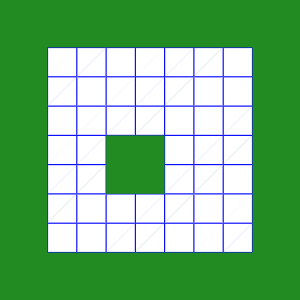BlankPoint
Repository source: BlankPoint
Other languages
See (Cxx), (PythonicAPI), (Java)
Question
If you have a question about this example, please use the VTK Discourse Forum
Code¶
BlankPoint.py
#!/usr/bin/env python3
# noinspection PyUnresolvedReferences
import vtkmodules.vtkInteractionStyle
# noinspection PyUnresolvedReferences
import vtkmodules.vtkRenderingOpenGL2
from vtkmodules.vtkCommonColor import vtkNamedColors
from vtkmodules.vtkCommonCore import vtkPoints
from vtkmodules.vtkCommonDataModel import vtkStructuredGrid
from vtkmodules.vtkFiltersGeometry import vtkStructuredGridGeometryFilter
from vtkmodules.vtkRenderingCore import (
vtkActor,
vtkDataSetMapper,
vtkRenderWindow,
vtkRenderWindowInteractor,
vtkRenderer
)
def main():
colors = vtkNamedColors()
points = vtkPoints()
grid_size = 8
counter = 0
pt_idx = 0
# Create a 5x5 grid of points
for j in range(0, grid_size):
for i in range(0, grid_size):
if i == 3 and j == 3: # Make one point higher than the rest.
points.InsertNextPoint(i, j, 2)
print(f'The different point is number {counter}.')
pt_idx = counter
else:
# Make most of the points the same height.
points.InsertNextPoint(i, j, 0)
counter += 1
structured_grid = vtkStructuredGrid()
# Specify the dimensions of the grid, set the points and blank one point.
structured_grid.SetDimensions(grid_size, grid_size, 1)
structured_grid.SetPoints(points)
structured_grid.BlankPoint(pt_idx)
# Check.
def is_visible(pt_num):
if structured_grid.IsPointVisible(pt_num):
return f'Point {pt_num:2d} is visible.'
else:
return f'Point {pt_num:2d} is not visible.'
# Should not be visible.
print(is_visible(pt_idx))
# Should be visible.
print(is_visible(7))
# We need the geometry filter to ensure that the
# blanked point and surrounding faces is missing.
geometry_filter = vtkStructuredGridGeometryFilter()
geometry_filter.SetInputData(structured_grid)
# Create a mapper and actor.
grid_mapper = vtkDataSetMapper()
grid_mapper.SetInputConnection(geometry_filter.GetOutputPort())
grid_actor = vtkActor()
grid_actor.SetMapper(grid_mapper)
grid_actor.GetProperty().EdgeVisibilityOn()
grid_actor.GetProperty().SetEdgeColor(colors.GetColor3d('Blue'))
# Visualize
renderer = vtkRenderer()
ren_win = vtkRenderWindow()
ren_win.AddRenderer(renderer)
iren = vtkRenderWindowInteractor()
iren.SetRenderWindow(ren_win)
renderer.AddActor(grid_actor)
renderer.SetBackground(colors.GetColor3d('ForestGreen'))
# ren_win.SetSize(640, 480)
ren_win.SetWindowName('BlankPoint')
ren_win.Render()
iren.Start()
if __name__ == '__main__':
main()
